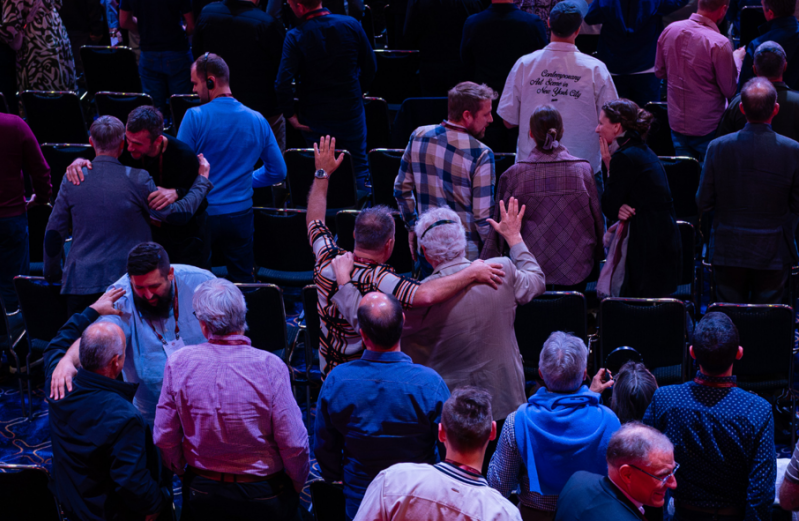
A powerful and deeply theological exposition on the meaning of Christ’s death and resurrection captivated delegates Tuesday (May 28) at the European Congress on Evangelism in Berlin, Germany. Delivered by Rev. Charles Price, the address urged evangelists across the continent to boldly center their message on the cross of Christ—a theme he described as indispensable to authentic gospel proclamation.
Speaking at a session hosted by the Billy Graham Evangelistic Association, Price—minister-at-large of The People’s Church in Toronto and a global preacher who has shared the gospel in over 100 countries—delivered a message titled “The Cross and the Blood of Christ Are Central to Preaching the Gospel.”
Drawing from 1 Corinthians 1:22-25, he emphasized that the heart of his message was “Christ crucified,” the foundation on which all true evangelism must rest.
He began by asking a question of great importance: for whom did Jesus die?
“Now, you might say, He died for the world,” said Price. “You might say he died for sinners, you might be in the school of thought that says he died for the elect, you may personalize him and say he died for me.
“And, of course, there is truth in all of that in that we are the beneficiaries of his death but it's not we who demand the death of Christ as punishment for sin.
“We would be very happy and sure with the arrangement that said, as long as you confess your sin, as long as you repent, as long as you turn away, God will forgive you.”
Price challenged delegates on whether they would be content with such a situation for resolving evil. He pointed out that in such a scenario no one needs “a cross for that” but “you just need to be sorry.”
The context of saying “sorry” was then explored. Children say the word for wrong actions, Price said, and parents readily forgive them.
“Nobody had to die, and yet Christ had to die. Why? You see, it's not we who demand the cross, it is God who demands the cross, it is the Father who demands the cross.”
Then a controversial perspective was put forward by Price, that what lay behind the cross is not love but the judgement of God.
“In the first instance Jesus died for his Father. I want to explain it, it's important. I'm going to make a statement that may sound wrong, may sound absurd. What lies behind the cross is not in the first instance the love of God, though the love of God does lie way in the back behind the cross, but what demands the cross is the judgment of God. It is the wrath of God.
“We'll not understand the cross until we know God's disposition towards sin, and the New Testament speaks of his wrath and of his judgment.”
Price then read Romans 3:24: “and are justified by his grace as a gift, through the redemption that is in Christ Jesus.” He outlined how the propitiation achieved by Christ’s shed blood means to appease an offended person, citing 1 John 4:10: “In this is love, not that we have loved God but that he loved us and sent his Son to be the propitiation for our sins.”
“This word is important when it comes to the work of Jesus Christ,” said Price. “He is the propitiation toward our sins, and not for ours only, but also for the sins of the world.”
In other words, the death of the Lord Jesus Christ on the cross was propitiating his Father, explained Price. He was addressing the justice of his Father and the wrath of his Father against sin.
“I know this is difficult for some people who don't like the idea of God not having negative emotions,” Price told delegates, as he explained the importance of these facts to better inform evangelistic proclamation, “but it's vital to understand this because sin is not essentially our problem that messes us up and gets us in trouble. It does all of that, but it is essentially a problem to God.
“If it's just a problem to me, then I get forgiven. Against God, it violates His justice, it violates His integrity, defeats the purpose in which He created us, and it is that which has to be addressed.”
Why the cross, though? Price opined two aspects in the character of God making the route of the cross necessary: firstly, to satisfy justice because God is just and secondly, to satisfy mercy because God is merciful.
However, that brought a further problem because justice and mercy are incompatible. Price revealed that the only way justice and mercy can become compatible is “by the introduction of a third party.”
Price used the illustration of being fined and required to attend a court of law for a speeding offence. He imagined someone caught speeding in a car and being required to stand in front of a judge. It is clear that “guilty” is the verdict and the judge has to choose either justice to punish the offender or let them go free. The judge fines 250 Euros ($284 USD) but someone, “a third party,” writes a check to pay the fine.
“And I walk out of that courtroom,” imagined Price. “Justice has been done, but mercy has been experienced by me to get the third party that stepped into the situation and paid the penalty on my behalf.”
Price conceded that delegates will know such an illustration of this court scene to explain salvation through Jesus Christ —or versions of it.
“But I’ve got to leave the courtroom,” Price imagined again. “And I leave there on the basis of the fact that justice has been addressed and satisfied, and now I have an experience… I have an experience of mercy.
“He became what I am in order that I might become what he is in my relationship to God. He was made sin on the cross, and I was made righteous.”
Price then asked delegates an “important question” as he examined the truth of the cross further for the purposes of bold evangelistic proclamation.
“To forgive us our sins and cleanse us of all unrighteousness, we appeal to His justice, which is why it is called ‘being justified.’ It is a just act of God to forgive us because [apart from] Christ nobody has paid for my sin.
“‘Justified’ is a legal term. It means justice has been completely satisfied.”
Illustrating this powerful point, Price recounted a conversation he once had with a Scottish lawyer. This man of the law told him that in Scotland, before capital punishment was abolished in 1969, some criminals would be hanged for their crimes.
When the criminals were dead, a sign would be placed on the prison gates giving the identity of the individual and the time and date of the execution. This sign would also carry a notification that the deceased “was justified.”
“Does it mean he was forgiven? No. Or didn’t do it after all? No. What it means is that justice has been fully and completely and totally satisfied. The judge has taken off his wig, and he's gone home!” stated Price, as he gave the parallel inference to what Jesus did on the cross to satisfy the justice required by God to deal with sin.
“The lawyers are working on other cases now. The policemen are back on the streets. It's over. He was justified, that's the legal meaning. It's over!
“And, in the cross of Jesus Christ, it is over to the extent that the apostle Paul wrote, ‘I have been crucified with Christ.’”
Price recalled holding a church meeting on Good Friday in Australia last month. He entitled his message at the time, “Welcome to your own funeral.”
A man said to him, “Intriguing title. What’s it about?” Price asked him who died on Good Friday and affirmed the man’s answers that Jesus died but pointed out that legally he died too.
“It’s over. Your sin is dealt with. Justified - Just As If I Died,” said Price, giving deeper clarity to the gospel truth, “because legally we have.”
The Bible teaches, Price reminded, that we were crucified with Christ and buried with him (Romans 6), then raised to the newness of eternal life.
Mercy and love lie “behind the cross” Price conceded but God could not forgive sin on the basis of mercy alone. “Or the cross wouldn’t be necessary. That’s why all the blood of the bulls and goats could only cover sin, it couldn’t remove it under the old covenant. A foreshadowing of what happened on the cross.”
Money checks can be postdated until the end of the month, Price said as another illustration, if an individual has no money in the account until then. The check itself has no intrinsic value at the moment until the cash really arrives in the account.
“All the priests in the Old Testament gave sacrifices and offered blood of bulls and goats [quoting Peter] but these could never take away sin. They can cover it, so a check covers debt, but does not remove it.
“There’s cash in the bank.”
“We appeal to the mercy of God but justice is not a discretion, it is obligatory,” Price stated. “I don’t want to be frivolous but let me give you another illustration. Justice is an obligation and God is obligated to forgive our sin when we confess it because Christ is born and will pay for it.
“Just suppose the reality about this, did you know regarding your sin and my sin, there is cash in the till?”
1 Peter 1:18 tells how the currency of sin was paid for not by silver or gold but by the precious blood of Christ, not with “perishable things.”
“That reconciles men and women and boys and girls to God,” said Price. “That clears the junk away, gets rid of the sin. It's being paid for and we're declared clean. That's why there's power in the cross.”
Billy Graham preached once and knew there was a “powerlessness.” Price told the story and a German businessman called John Bolton who told him it was because he had not preached on the cross. That observation changed Graham who vowed to preach only on the cross, the blood and the resurrection, the very heart of the gospel, from then on.
“For without the gospel, or without the cross, there is no salvation, there is no forgiveness,” Price said, and he pointed out how Paul in Galatians 6:14 vowed to boast of nothing else “except the cross of our Lord Jesus Christ.”
“That's at the heart of the gospel,” he added. “And from the cross flows justification, justice has been done, and from justification flows forgiveness, cleansing.”
“When the Holy Spirit speaks about our sin, he convicts us. He convicts us of guilt. He convicts us of righteousness. And he convicts us of judgment. That judgment has taken place in the person of Jesus Christ, that our guilt has been removed, and we are declared righteous,” concluded Price in his encouragement to the evangelists at the Berlin Congress. He exhorted them to “live it and preach it.”





